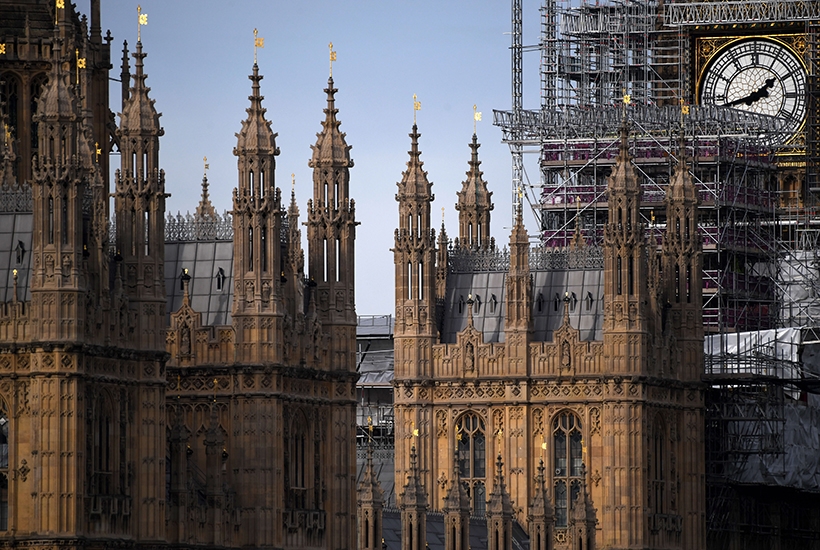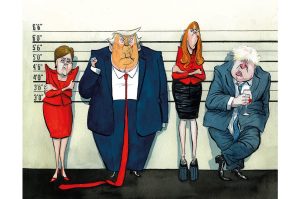‘The normal grease of politics is not there,’ bemoans one sociable UK cabinet minister. Certainly, the whispered conversations in corridors that make up so much of Westminster life are in abeyance during this period of social distancing. The fact that the backbenches and the cabinet have deep reservations about the government’s approach matters far less than it would in normal times. In the Zoom parliament, there is no such thing as the mood of the House. One Tory grandee pushing for a significant easing of the lockdown complains that the current arrangements ‘make it easier for No. 10 to ignore parliament and cabinet’.
But contrary to appearances, politics has actually sped up, rather than stopped, during the pandemic. ‘The past two months have been like two years of government,’ says one cabinet minister.
At home and abroad, coronavirus has emphasized trends that were already in existence. It has exacerbated the tensions between the northern and southern countries in the eurozone and it has accelerated the deterioration in relations between the United States and China.
In Whitehall, there has long been a view that the future direction of US foreign policy would not become clear until after the presidential election in November. After all, Joe Biden — who first entered the Senate in 1973 — offers a return to an earlier, pre-Trump era of US diplomacy. But it is now evident that the election is turning into a question of who can be tougher on China. Donald Trump has tried to blame Beijing for the virus and accused Biden of being soft. The Biden campaign’s response has been to accuse Trump of having ‘rolled over for the Chinese’ in accepting their original assurances that they had the virus under control.
US public opinion is now more hostile to China than it has been since polling began on this question. There is a bipartisan view in US foreign policy circles that America must take more action to check China’s rise, whoever wins in November. This has major implications for the UK. It is going to become much harder for the government to further an economic relationship with China while maintaining Britain’s unique security partnership with the US.
But just as this crisis has sped up a change in American attitudes to China, it has done the same within the Tory party. One influential Tory MP who wants to see a tougher line on Beijing says that without coronavirus, ‘it would have taken 10 years to wise up to China. It has completely changed the terms of debate.’ In a sign of this, one senior No. 10 figure tells me that substantial concessions will have to be offered if the government is not to lose a vote on the Chinese company Huawei’s involvement in the development of the UK’s 5G network.
Hawkishness on China is soon going to become a feature of the new Toryism. One question after last year’s election was what would keep together the Tory electoral coalition of the north and south once the issues of Corbyn and Brexit had vanished. Well, Sino-skepticism could become one of the things that bonds the party. Different parts of the Tory coalition are united by their suspicion of Beijing: many of the old Cameron modernizers who are now horrified by China’s human rights abuses; the Tories who believe that no hi-tech UK industrial strategy can succeed in the party’s new ‘red wall’ seats unless China’s plans to dominate the industries of the future are countered; and those who regard the ‘special relationship’ with the US as a pillar of UK foreign policy.
At the moment, the British government’s language doesn’t really reflect this shift in Conservative opinion. One reason for this may well be Downing Street’s concerns over personal protective equipment, much of which is sourced from China. This week Prof Jonathan Van-Tam, the deputy chief medical officer for England, said that the government is facing ‘continuing challenges’ in passing its test of ensuring future supply is able to meet demand. This is a problem because as more of the economy opens up, more people will need PPE. One source at the centre of the government’s coronavirus response argues that the state is going to have to provide it to public sector workers if the government is to get the unions to agree to the reopening of schools and the like. But if the UK engages in heavy criticism of Beijing, it is not hard to believe that China’s ‘wolf-warrior’ diplomacy would lead to Britain being cut off by Chinese suppliers.
Another change hastened by this crisis has been the move away from the Thatcher-Blair consensus that what voters want is less government. The government has intervened in the economy in drastic ways to protect jobs and businesses. Its plan to tackle the pandemic by tracking and tracing via a mobile phone app involves much of the population having the state in their pocket. This expanded role might be necessary crisis management, but as one cabinet minister admits, the challenge is: ‘How do you manage these expectations?’
This problem is made more acute by the fact that the state will have fewer resources in future. It is hard to believe that the economy is going to return to pre-COVID levels rapidly. Even once the lockdown has been lifted, social distancing will still depress productivity. At the same time, demand will not return instantly — the British government’s warnings about the dangers of going outside have been too successful for that.
On Sunday night, Boris Johnson will try to move the UK beyond the ‘stay at home, protect the NHS, save lives’ phase of this crisis. But the journey out will be long. The test, track and trace route the government has now opted for requires the number of new infections to fall significantly below where it is now. Also, the UK’s grim death toll has prompted caution in government. There is now less willingness to rely on the NHS’s new capacity to handle any new spike than there was when lockdown was first introduced.
The coronavirus catalyst means we are now far further into the 21st century than we otherwise would have been.
This article was originally published in
The Spectator’s UK magazine. Subscribe to the US edition here.


















